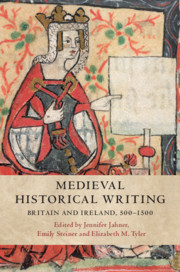Book contents
- Medieval Historical Writing
- Medieval Historical Writing
- Copyright page
- Contents
- Illustrations
- Notes on Contributors
- Abbreviations
- General Introduction
- Part I Time
- Part II Place
- Chapter 8 Mental Maps: Sense of Place in Medieval British Historical Writing
- Chapter 9 Viking Armies and their Historical Legacy across England’s North–South Divide, c.790–c.1100
- Chapter 10 Cross-Channel Networks of History Writing: The Anglo-Saxon Chronicle
- Chapter 11 Creating and Curating an Archive: Bury St Edmunds and its Anglo-Saxon Past
- Chapter 12 Historical Writing in Medieval Wales
- Chapter 13 Scotland and Anglo-Scottish Border Writing
- Chapter 14 London Histories
- Chapter 15 History at the Universities: Oxford, Cambridge, and Paris
- Part III Practice
- Part IV Genre
- Bibliography
- Index
Chapter 15 - History at the Universities: Oxford, Cambridge, and Paris
from Part II - Place
Published online by Cambridge University Press: 19 December 2019
- Medieval Historical Writing
- Medieval Historical Writing
- Copyright page
- Contents
- Illustrations
- Notes on Contributors
- Abbreviations
- General Introduction
- Part I Time
- Part II Place
- Chapter 8 Mental Maps: Sense of Place in Medieval British Historical Writing
- Chapter 9 Viking Armies and their Historical Legacy across England’s North–South Divide, c.790–c.1100
- Chapter 10 Cross-Channel Networks of History Writing: The Anglo-Saxon Chronicle
- Chapter 11 Creating and Curating an Archive: Bury St Edmunds and its Anglo-Saxon Past
- Chapter 12 Historical Writing in Medieval Wales
- Chapter 13 Scotland and Anglo-Scottish Border Writing
- Chapter 14 London Histories
- Chapter 15 History at the Universities: Oxford, Cambridge, and Paris
- Part III Practice
- Part IV Genre
- Bibliography
- Index
Summary
Given its absence from the university curriculum and the apparent indifference of ‘scholasticism’ to the subject, it has been assumed that medieval university scholars neither wrote nor read history. Although the universities were indeed not centres of historical writing, several friars and monks who had studied at university did write history, and many university alumni owned historical works and donated them to their college and university libraries. Moreover, evidence for university scholars’ interest in history increases considerably when one discards the modern historicist/positivist definition of historiography and regards it instead as its medieval readers did, as encompassing texts about past deeds and sayings which offered timeless moral and practical lessons. This chapter argues that university scholars’ reading and writing of history was closely tied to their interest in the classics and devotion to pastoral care. It also identifies the historical works at the universities and their owners and donors.
- Type
- Chapter
- Information
- Medieval Historical WritingBritain and Ireland, 500–1500, pp. 258 - 276Publisher: Cambridge University PressPrint publication year: 2019



